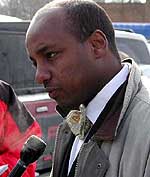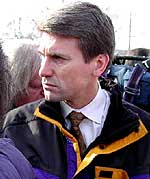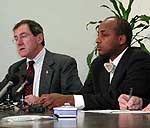By Art Hughes
Minnesota Public Radio
March 11, 2002
Somali leaders in Minneapolis are aiming strong criticism toward the police department, after officers shot and killed a Somali man wielding a machete. Police say the man was a threat to officers and bystanders. But the incident has triggered an uproar by Somali immigrants, who say the use of such force was unneccesary and want Police Chief Robert Olson fired. The incident has also called up past criticisms of how the Minneapolis police interact with people who are mentally ill.
| |
|
|
|
||
Representatives of Minneapolis' Somali community say the shooting of Abu Kassim Jeilani is murder, and the police officers involved should be prosecuted.
Osman Sahardeed, director of Somali Community of Minnesota, says the police who responded to the scene - in which Kassim was carrying a machete and a crowbar - used excessive force.
"Those officers who have been involoved in this shooting should not be reassigned to their jobs," says Sahardeed. "We believe they are criminals, and they should be treated the way criminals are treated."
Sahardeed and others point to a string of incidents between law enforcement and Somalis as evidence the police are working against them. Last fall, federal agents closed down a south Minneapolis Somali money wire service, saying the service is a front for terrorists.
Late last year, a Somali man died after he was hit in the head while waiting for a bus. The medical examaner initially said the man died of natural causes. The death was later ruled a homicide.
And last summer, Somali leaders complained about the police treatment of a group of Somali men in town for an annual festival and amateur soccer tournament. Somali representatives say the men were doing nothing but waiting for a ride.
| |
|
|
|
||
Omar Jamal of the Somali Justice Advocacy Center says the police ignored those on the scene who wanted to talk to Jeilani, and get him to put down his weapons.
"We are taxpayers. We pay these people to serve and protect us. We pay taxes and they pay taxes. Why are the reason is to protection from them? (sic) Because we don't want them to kill us, and we don't want the city of Minneapolis to become a slaughterhouse for the immigrants one after another," Jamal says.
Friends of Jeilani's say he suffered from mental illness that had gotten worse in recent weeks. Minneapolis police have faced criticisms before about dealing with people with mental illness.
Police shot and killed a delusional Barbara Schnieder in the summer of 2000 when she confronted them with a knife in her apartment. Three months later, police shot and killed Alfred Sanders after they say he tried to ram them with his car. Sanders had been acting erratically.
A year ago the department created a Critical Incident Team, to deal specifically with mental illness cases. Two CIT officers were called to the scene Sunday minutes after police first contacted Jeilani. They tried more than once to immobilize him with non-lethal electric shocks from a Tazer, but failed. Police spokeswoman Cyndi Montgomery says the five officers on the scene followed proper procedure before resorting to deadly force.
"This was in broad daylight. There were many citizens in the area. We have an individual carrying a machete and a crowbar. Our officers - from what we reviewed - followed policy and procudure in this case, by utilizing everything they have and their training to defuse the situation," Montgomery says.
| |
|
|
|
||
Some 30 to 40 Somalis, including Jeilani's widow, met for two hours with Mayor R.T. Rybak in his office. The mayor says Somalis and others need to wait until all the information is available before reaching conclusions.
"I fully understand that this incident, to many people, is not seen as an isolated incident. Issues of race, issues of mental health and issues of policing have become connected for some time," Rybak said. "It is important for all of us to recognize that - to the degree to which people connect these issues - we are not safe. It's important for us to realize we'll continue to work on the structural issues that are part of this."
About firing the police chief, Rybak says he makes no connection between the police chief's job and this shooting.
City councilmember Dean Zimmerman, who represents the ward in which the shooting occurred, says he will introduce an ordinance to review the use of guns by police.
"I just question the need to use multiple shots to stop a person who does not have a firearm in their hand. I don't know what the discussion will lead to. I just know we have to have the discussion. I know we have to change the climate that exists between the police and the community," says Zimmerman.
Five officers at the scene fired their guns, although police aren't saying how many total shots were fired.
Somali advocates and an anti-police brutality group are scheduling rallies later this month.



